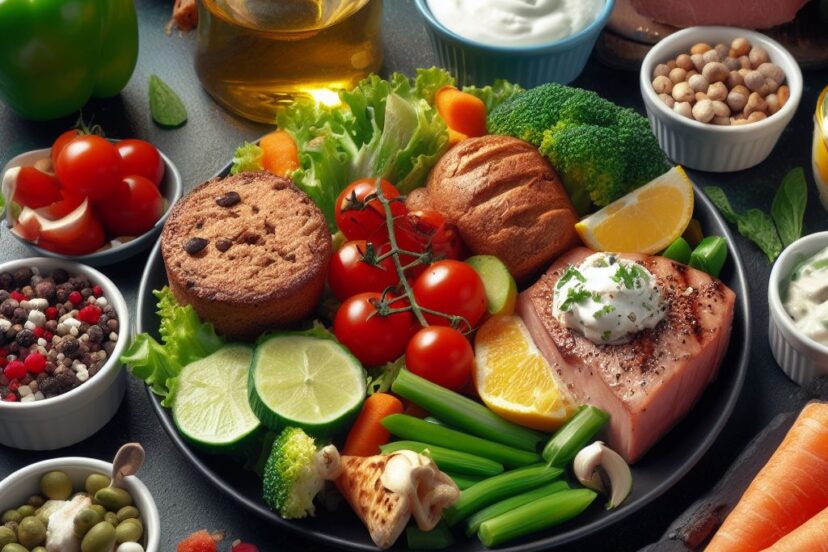Nutrition and Wellness: A Guide to Healthy Living
*We may earn a commission for purchases made using our links. Please see our disclosure to learn more.
Nutrition and Wellness: Key Strategies for Optimal Health
Understanding the impact of nutrition and wellness on our well-being is vital. I believe that good nutrition is the cornerstone of a healthy life. It involves more than just the food on our plates; it encompasses the science of nutrients and how they nourish our body. Providing our bodies with the right balance of vitamins, minerals, proteins, carbohydrates, and fats is essential to maintain energy, support bodily functions, and prevent chronic diseases.

I keep in mind that wellness is a holistic concept, integrating not just physical health but also emotional and mental balance. In today’s fast-paced world, managing stress and making sound lifestyle choices contribute significantly to our overall wellness. Nutrition plays a powerful role here, impacting everything from mood to energy levels.
Finally, it’s crucial to recognize that there is no one-size-fits-all approach to nutrition and wellness. Each individual has unique dietary needs and wellness goals. I stay abreast of evidence-based dietary advice and wellness strategies that can be adapted to different lifestyles and health requirements. My aim is to empower individuals to make informed choices that lead to a sustainable and healthy lifestyle.
Fundamentals of Nutrition

In exploring the fundamentals of nutrition, I focus on the key constituents of our diet and their impact on overall health. Understanding the balance of macronutrients and micronutrients, the role that diet plays in maintaining health, and the importance of evidence-based practice in nutrition science will empower informed decisions about food choices.
Nutrition and Wellness: Macronutrients and Micronutrients
Macronutrients are the nutrients our bodies need in larger quantities. These consist of:
- Proteins: Vital for repairing tissues and crucial for growth and maintenance.
- Fats: Necessary for energy, cell growth, and protecting organs.
- Carbohydrates: Our main energy source.
In contrast, micronutrients are nutrients the body needs in smaller amounts. They are just as critical to our health and include:
- Vitamins: Organic compounds with diverse roles such as vitamin A for vision and vitamin D for bone health.
- Minerals: Elements like calcium for bones and iron for blood.
These nutrients support everything from muscle function to immune defense.
The Role of Diet in Health
My diet directly influences my health. A diet rich in vegetables, fruits, whole grains, lean proteins, and healthy fats can support a healthy weight and reduce the risk of chronic diseases such as obesity, heart disease, and type 2 diabetes. On the other hand, diets high in processed foods and sugars can contribute to poor health outcomes.
Nutrition Science and Evidence-based Practice
Nutrition science is the field where scientists explore how the body utilizes nutrients and its relationship with diet, health, and disease. It’s important to rely on evidence-based practice – this means making dietary choices based on rigorous data and recommendations from trusted authorities like registered dietitians.
Understanding Food Types
My diet consists of a diverse range of food types, each with unique nutritional profiles:
- Whole Foods: Such as vegetables, fruits, whole grains, fish, eggs, nuts, and seeds are typically nutrient-dense.
- Processed Foods: These often contain added sugars, salts, and fats, which may contribute to health issues when consumed in excess.
Choosing a variety of whole foods can help maintain a balanced diet and promote my overall health.
Wellness and Lifestyle

In discussing wellness and lifestyle, I will cover the intersection of physical fitness, mental health, and the specific lifestyle factors that underpin wellness. I’ll also address the role nutrition plays in managing diseases, underscoring how each aspect contributes to overall health.
Nutrition and Wellness: Exercise and Physical Fitness
Exercise is a cornerstone of a healthy lifestyle, contributing significantly to overall wellness. As an individual, I recognize that regular physical activity boosts my metabolic rate which can aid in weight management and increases my body’s efficiency at processing nutrients. For athletes, fitness is not just about performance—it’s central to their careers, with structured training regimens tailored to optimize their physical capabilities.
Mental Health and Nutrition
The food I consume directly affects my mental well-being. Foods rich in omega-3 fatty acids, for example, are known to reduce the risk of depression. Additionally, practices such as mindfulness and yoga serve to alleviate stress and improve my mental state. I’m aware that a balanced diet complemented by these practices promotes resilience against mental health challenges.
Lifestyle Factors Affecting Wellness
A myriad of lifestyle factors such as sleep, stress levels, and daily routines play a role in my state of wellness. Consistent, high-quality sleep is tied to better health outcomes, while chronic stress can be detrimental, leading to symptoms like high blood pressure and reduced mental health. Simple changes, like incorporating a spa day or regular yoga sessions, have the potential to greatly lessen stress.
Nutrition and Disease Management
Nutritional choices can either exacerbate or alleviate the symptoms of chronic diseases. For instance, adopting a diet low in processed sugars can be beneficial for managing diabetes. On the other hand, integrating high-fiber foods bolsters digestive health and improves symptoms in those with gastrointestinal conditions. My focus on eating well is not just about prevention; it’s also about treatment and managing existing health issues effectively.
In summary, wellness is a multifaceted concept, embracing physical health, mental resilience, and the interplay of lifestyle choices. My personal commitment to fitness, mindful eating, and stress reduction is key to maintaining a balanced and healthy life.
Professional Pathways in Nutrition and Wellness
In exploring the diverse career paths in the nutrition sector, I’ll discuss the trajectory of becoming a nutrition specialist, necessary education and certifications, and the role of nutrition in healthcare.

Nutrition and Wellness: Becoming a Nutrition Specialist
Becoming a specialist in the field of nutrition requires a multifaceted approach encompassing formal education and practical experience. Career options are broad, including but not limited to registered dietitian (RD), certified nutrition coach, and sports nutritionist. The journey typically begins with a solid foundational program in nutrition sciences followed by more focused training in areas like functional nutrition or sports nutrition.
Nutrition and Wellness: Education and Certification
To work as a nutrition professional, rigorous education is essential. Completion of a degree in nutritional sciences or a related field is a common starting point. Specialized courses often follow, leading to specific certifications. For example, an RD must pass the certification exam after fulfilling their degree and internship requirements. Moreover, the Holistic Nutrition Credentialing Board provides credentials specifically tailored to holistic nutrition professionals.
The table below outlines roles and associated educational pathways:
| Role | Minimum Education | Certification Required |
| Registered Dietitian (RD) | Bachelor’s degree in dietetics/nutrition, Internship | RD exam |
| Nutrition Coach | Varied; often a certification program | Certification by an accredited organization |
| Sports Nutritionist | Bachelor’s in nutrition, specialized training in sports nutrition | May require Certified Specialist in Sports Dietetics (CSSD) |
Nutrition and Wellness in Healthcare
Nutrition experts are integral to healthcare teams in various settings, including hospitals and public health initiatives. A registered dietitian nutritionist (RDN) plays a pivotal role in creating diet plans for patients with diverse medical needs. These professionals may acquire additional qualifications in specialized fields, such as pediatric or renal nutrition, often after completing advanced studies in a medical school or within universities that offer graduate programs.
In summary, the field of nutrition and wellness offers a range of professional pathways for those interested in supporting health through food and diet. Whether one’s goal is to become an RD, a nutrition coach, or specialize in an area like sports nutrition, the journey involves dedicated study, practical experience, and obtaining the relevant certifications. With the growing focus on the prevention and management of chronic diseases, as well as an increase in athletic performance optimization, the demand for skilled nutrition professionals continues to rise.
Frequently Asked Questions about Nutrition and Wellness

My expertise in nutrition and wellness underscores the importance of informed dietary choices and their impact on health. Therefore, I’ve prepared answers to commonly asked questions to provide clarity and guidance.
1. What dietary habits can improve overall well-being?
I recognize that a balanced diet rich in fruits, vegetables, whole grains, lean proteins, and healthy fats promotes overall well-being. Regular meals and mindful eating contribute to sustained energy and optimal health.
2. Which nutrients are essential for maintaining good health?
My education highlights that essential nutrients include vitamins, minerals, carbohydrates, proteins, and fats. Each plays a crucial role in the body’s functions, and maintaining a balance is key to good health.
3. How can one balance micronutrients and macronutrients in their diet?
In my experience, balancing micronutrients (vitamins and minerals) with macronutrients (carbohydrates, proteins, and fats) involves a varied diet with a wide range of food groups, emphasizing whole foods over processed ones.
4. What are the impacts of hydration on physical and mental performance?
I’ve seen that adequate hydration is vital for maintaining normal temperature and joint lubrication. It also contributes to cognitive functions and physical performance.
5. How does gut health influence overall wellness?
My understanding is that gut health significantly affects overall wellness by influencing the immune system, nutrient absorption, and possibly even mood regulation due to the gut-brain axis.
What roles do vitamins and minerals play in supporting the immune system?
I’ve learned that vitamins such as C and D, and minerals like zinc and selenium, support the immune system by enhancing its response and protecting against infections and diseases.




